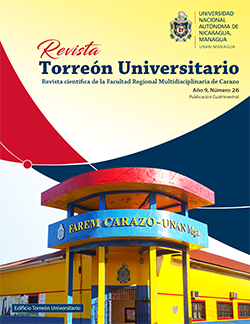Collaborative learning as a didactic strategy to promote oral English practice in extra-school hours using Google Hangouts
DOI:
https://doi.org/10.5377/torreon.v9i26.10255Keywords:
collaborative learning, Google Hangouts, English oral practice, extra school hoursAbstract
The present study aims to analyze the incidence of collaborative learning to promote oral English practice in extra-curricular hours among students in the third year of the English career during the second semester of 2017: Google Hangouts as a technological application. This study is positioned in the socio-critical paradigm, with a mixed approach, which is descriptive and cross-sectional. The sample was of 38 informants, 4 teachers, and 34 students. The survey and the interview were used as information collection instruments validated through a pilot and expert judgment, respectively. The data were analyzed using SPSS version 21 software in the quantitative phase, and in the qualitative phase, using matrices of main categories, then a triangulation of the information obtained was carried out.
As main results, we found that most of the students are familiar with the use of Google Hangouts, and motivated to practice English through this tool, as well as through participation in collaborative learning activities, which contributed to improving other English sub-skills that foster the development of oral competence. On the other hand, teachers do apply activities oriented to the practice of English through ICT resources, but these are not directly focused on the development of oral language practice.
In conclusion, the study showed that it had a positive impact both on the motivational aspect of the students, as well as on their competencies and communication skills in the English language.
Downloads
Downloads
Published
How to Cite
Issue
Section
License
Los autores que publican en esta revista están de acuerdo con los siguientes términos.
- El autor o los autores de los artículos, ensayos o investigaciones conceden a la Universidad Nacional Autónoma de Nicaragua, Managua (UNAN-Managua) los derechos de edición (copyright) del trabajo enviado, por consiguiente la Universidad cuenta con el derecho exclusivo para publicar el artículo durante el periodo completo de los derechos de autor.
- Estos derechos de autor/ autores autorizan a la Revista Torreón Universitario y a la Universidad editar y divulgar/publicar el artículo en dicha Revista, incluyendo reproducción impresa y electrónica, el almacenamiento, recuperación y cualquier otro tipo de publicación, y fuentes de información secundaria como servicios de resúmenes y bases de datos, así mismo la facultan a proteger el artículo contra el uso no autorizado para su difusión por medios impresos o electrónicos (PDF, HTML, EPUB, XML u otros).
Licencia para el uso del contenido
La revista hace uso de la Licencia Creative Commons Atribución-NoComercial-SinDerivar 4.0 Internacional.
Bajo esta declaración:

Este revista está sujeta a una licencia de Creative Commons Reconocimiento-NoComercial-SinObraDerivada 4.0 Internacional. Puede ser copiada, distribuida y transmitida públicamente siempre y cuando se cite al autor y la fuente (Revista Torreón Universitario), no debe modificarse ni utilizarse con ningún fin comercial. La licencia completa se puede consultar en http://creativecommons.org/licenses/by-nc-nd/4.0/.

